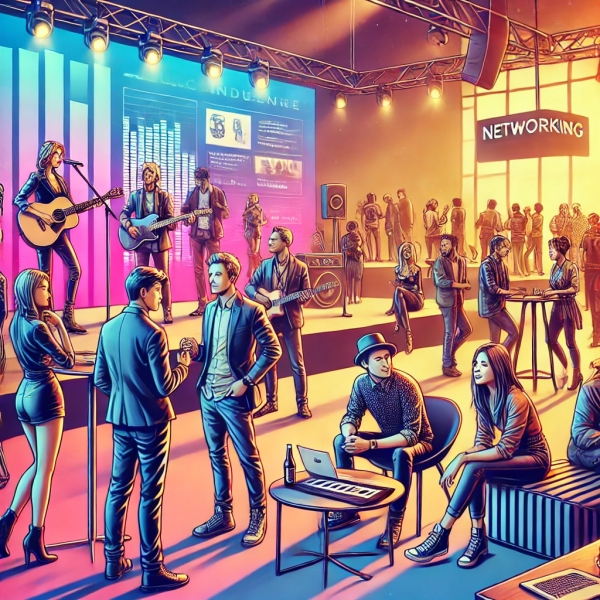How to Improve Your Essential Networking Skills as a Musician/Artist to Benefit Your Career
In the music industry, talent alone isn’t always enough to propel you forward. Networking plays a crucial role in building relationships, securing gigs, and creating opportunities for collaboration. Whether you're an independent artist, a producer, or a musician trying to make your mark, mastering networking skills can significantly boost your career. Here’s how you can improve your networking skills and connect with the right people to take your career to the next level.
1. Develop a Strong Personal Brand
Before reaching out to industry professionals, ensure your personal brand is well-defined. Your brand should clearly communicate who you are as an artist, your style, and your unique value proposition. Consider the following:
- A professional artist/band name
- A compelling bio that tells your story
- High-quality photos and promotional materials
- A consistent social media presence
- A well-maintained website showcasing your music, videos, and press coverage
When you have a strong personal brand, you make it easier for industry professionals to remember you and take you seriously.
2. Leverage Social Media & Online Platforms
In today’s digital age, social media is a powerful networking tool for musicians. Platforms like Instagram, TikTok, X (Twitter), Facebook, and LinkedIn allow you to engage with fans, industry professionals, and fellow artists. Here’s how to use social media for networking:
- Follow and engage with industry professionals, producers, and fellow artists.
- Comment on and share content from those you admire.
- Use direct messaging strategically to introduce yourself and start conversations.
- Participate in relevant online communities and forums, such as music production groups or industry networking groups on Facebook and Discord.
Additionally, platforms like SoundCloud, Bandcamp, and YouTube provide opportunities to showcase your work and connect with potential collaborators.
3. Attend Music Events and Industry Conferences
While online networking is crucial, in-person networking can be even more impactful. Attending music events, industry conferences, and workshops gives you the opportunity to meet like-minded people and influential figures in the industry. Consider attending:
- Music festivals and industry conferences (e.g., SXSW, MIDEM, ASCAP Expo)
- Local open mics and jam sessions
- Artist networking meetups and industry mixers
- Workshops and music business seminars
When attending these events, be prepared to introduce yourself confidently and have a short “elevator pitch” about who you are and what you do. Don’t be afraid to start conversations, exchange contact information, and follow up with people after the event.
4. Build Genuine Relationships
Networking isn’t just about meeting people—it’s about building meaningful, long-term relationships. Instead of approaching networking with a “what can you do for me?” mindset, focus on how you can bring value to others. Here’s how to foster genuine connections:
- Show genuine interest in other people’s work.
- Offer support and promote fellow artists’ music.
- Collaborate on projects without expecting immediate returns.
- Stay in touch and check in regularly.
By building authentic relationships, you’ll naturally create opportunities for collaborations, mentorships, and referrals.
5. Perfect Your Communication Skills
Good communication is key to effective networking. Whether you’re sending an email, making a phone call, or talking in person, your approach matters. To improve your communication:
- Be clear and concise in your messages.
- Practice active listening and show interest in conversations.
- Be professional and respectful in your interactions.
- Personalize your outreach instead of using generic messages.
When reaching out via email, ensure your message is well-structured, to the point, and includes links to your work.
6. Collaborate and Work with Others
One of the best ways to expand your network is through collaborations. Working with fellow artists, producers, and industry professionals opens doors to new audiences and potential opportunities. Ways to collaborate include:
- Featuring other artists in your songs and vice versa.
- Co-writing and co-producing tracks.
- Performing together at live shows.
- Swapping promotional support on social media.
When you collaborate, you not only strengthen your relationships but also broaden your exposure in the industry.
7. Follow Up and Stay Connected
Networking doesn’t end after the first interaction. To maintain relationships, follow up with the people you meet. Simple ways to stay connected include:
- Sending a quick “nice to meet you” email after an event.
- Engaging with their social media content.
- Checking in periodically to see how they’re doing.
- Sharing relevant industry news or opportunities with them.
Consistency is key to keeping yourself on people’s radar without being overly pushy.
8. Seek Mentorship and Guidance
Learning from experienced professionals can fast-track your career. If you meet someone whose career path inspires you, don’t be afraid to ask for guidance. Many successful artists and industry professionals are open to mentoring up-and-coming talent. When seeking mentorship:
- Be respectful of their time.
- Ask thoughtful questions.
- Show appreciation for their advice and insights.
- Implement their suggestions and share your progress.
A good mentor can provide valuable industry insights, career advice, and potential connections.
Final Thoughts
Networking is an essential skill for any musician or artist looking to grow their career. By developing a strong brand, utilizing social media, attending events, building genuine relationships, and improving communication, you can create valuable connections that lead to new opportunities. Remember, networking is about quality over quantity—focus on building meaningful connections rather than just collecting contacts. With consistent effort and a proactive approach, your network will become one of your greatest assets in the music industry.



